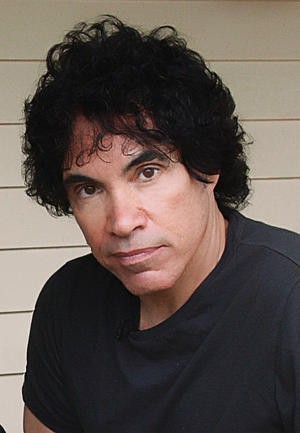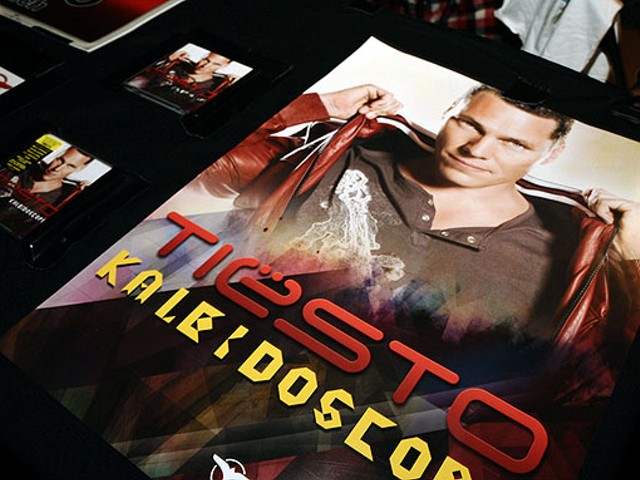In this week's issue, I spoke with Hall & Oates' guitarist and songwriter, John Oates. Oates will be in town on Friday night to play the annual American Mustache Institute 'Stache Bash at the Roberts Orpheum.
Despite being clean-shaven for almost 20 years, Oates took some time to reflect on his old hirsute image as well as his band's contribution to the American musical landscape. Unfortunately the dead-tree version of the RFT couldn't contain all the history, wisdom and recollections of our conversation, so here are the remainders.
On his famed mustache and its rebirth on Internet shows:
Was your mustache such a big part of your visual identity that people couldn't conceive of John Oates without it? I did it in Tokyo. We were invited by Yoko Ono to do a show for the 10-year anniversary of John Lennon's death. It was a big show there with Miles Davis and Lenny Kravitz and whole bunch of really cool people. The night after the show, I came back to my hotel room - we were gonna leave the following morning - and I looked at myself in the mirror and the mustache didn't look right. And I shaved it off right then and there. I arrived at the airport the next morning, and everyone looked at me kinda weird, and that was it. I never grew it back after that.
On Hall & Oates' history and musical legacy: It strikes me that throughout much of 90s that Hall & Oates was a punch line and seen as an 80s vestige. But in the last five years, people seem to be recognizing the greatness of the back catalogue. Is that something that you have perceived as well? Yes, definitely. Things have changed in a lot of ways. Back in the '70s and '80s, there was a cadre of rock journalists who dictated tastes and were able to manipulate people's perception of things through the power of their publications. That's gone, which is, I think, fantastic. A new generation of people with access to the Internet and so much at their fingertips -- they make their own decisions and listen to things in an unbiased way. All of a sudden these new bands who grew up hearing our material, and the fact that our songs and our records informed them, in a way that that's how they hear pop music. We're their roots, basically, just like the Temptations and Elvis and Curtis Mayfield and Doc Watson were my roots. We're the roots of a new generation of bands and they're not afraid to say to their fans, "Hey, look what Hall & Oates did. This is a great song," or "I love this song, and this is why." So a whole new generation of fans is looking at us in a completely unbiased, objective way.
When you look at the body of work, and you look at the success, and you look at the amount of years that we've endured -- and the fact that we're still doing it -- I'm not saying this from an egotistical point of view, but it's impressive. It's a very hard business to have any success in, much less survive for close to 40 years and have a lot of success in. So I think a new generation of musicians has a lot of respect for us, and they are passing that on. And I'm very happy about that. I don't know if you're aware, but we have a boxed set that comes out on October 13.
I heard about this. What does that entail? That's where it really comes together. For the people that know us only for our hits, they'll be very surprised because there is so much deep and adventurous and unusual music that is just as much part of our musical legacy as the hits. And I think it'll blow people's minds. But for the real hard-core fan who knows about those kind of songs, there's also some great stuff that is really appealing. We have unreleased tracks, we have live tracks that have never been heard before, stuff we did in England on our first tour. Just really cool stuff. It'll give people a different perspective of Hall & Oates. They'll see us in a different light other than the band that had all the big hits in the 80s.
Hall and Oates covering "Love Train" at the final night of the Spectrum in Philadelphia, 10/23/09. Hooters, Soul Survivor and Todd Rundgren also present. When you guys were coming up in Philadelphia, the Philly soul scene was just catching fire. Was that something you felt plugged into? We were a part of it; we were a part of the actual development of that sound. The Philly Soul sound is pretty much identified as [famed producers/songwriters Kenny] Gamble and [Leon] Huff; Gamble and Huff and Daryl and I started at the same time. Philadelphia had a pop tradition before that, that was Chubby Checker and Bobby Rydell and Fabian and all the Italian teen pop idols that came out of South Philly. That was happening in the '60s. Philadelphia's R&B scene really began to happen in the mid to late '60s, and that's when Daryl and I were starting out there as well. Our first records were made with Gamble and Huff's people; we were basically one group of people. In fact, the boxed set starts out with two songs, both recorded in 1967, one that Daryl did with his band and one that I did with my band before we had met. And that's how the boxed set starts.
We were part of that scene, and we made a conscious decision. We could have stayed in Philadelphia and worked with Gamble and Huff and been part of their team, but we really had a vision of doing something different and something on our own, and we moved to New York. I think a funny thing about the Philadelphia connection is that even though we're so identified as a band from Philly, and we're proud of that, the truth of the matter is I only lived in Philadelphia for four years and never made a record in Philadelphia. Daryl and I have never recorded an album in Philadelphia. It's interesting, but it's one of those things: it's like Rocky. Once Philly embraces you, you're in.
I assume there's not a bronze statue yet of Hall & Oates, like Rocky? We have a star on the Walk of Fame there, but no.
Speaking of how new bands have embraced your songs, I always think that whenever hip-hop acts sample a song, they don't it for irony's sake or to be funny. They do it because there's a groove there. I know a lot of your songs have been sampled, songs that have more than a flash-in-the-pan pop sheen. I wonder if having that rhythm & blues and soul background fed into that. It doesn't surprise me in the least, because we started out that way. Our songs were played only on Philadelphia's R&B stations. One of our first goals as recording artists was, "How do we get on white radio?" So being accepted by R&B artists and the urban community is totally normal for us, and very comfortable. In fact, the R&B community has probably been out biggest supporters through our whole career. So the fact that we're getting sampled doesn't surprise me in the least. I think it's an honor. We've done what we've done and that music is out there, so when someone else does it, it's interesting to see where they take it.
What does the legacy of Hall & Oates look like to you? To me, it's a lifetime of music. It's a lifetime of a relationship. I met Daryl right out of high school, we've known each other since we've been teenagers, we grew up together, we experienced so much of what we've done traveling around the world together. So it's like a brotherhood, and that bond is almost unshakable. But at the same time, we're completely different people, and we're not joined at the hip. Our lives have moved on, we have different families, we live in different parts of the country. But when we get together, it's like nothing has ever changed. It's like this seamless relationship that just carries on. I assume we'll just continue to play together until we can't, or don't want to, but I can't even envision that.






